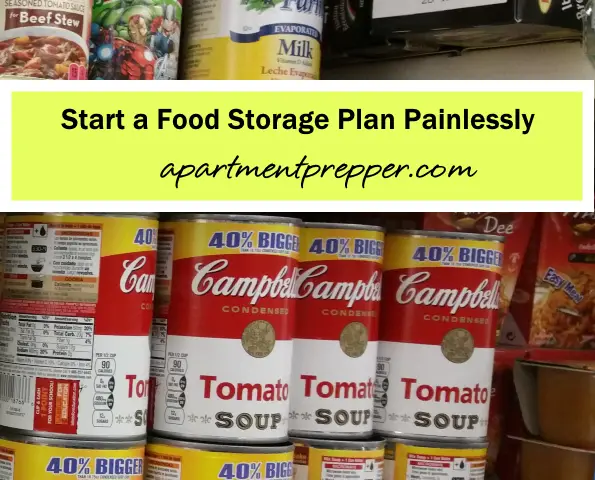This post is by Bernie Carr, apartmentprepper.com
A few people I know have nearly no food stored at home. They eat out on a regular basis and therefore feel no need to have food around the house except for a gallon of milk and some orange juice. I’ve tried to bring up the subject tactfully, and they do realize they need to have some emergency food.
One of the challenges of building up food storage is just getting started and taking action. Just thinking about collecting all that food can scare someone into putting it off. It is easy to come up with excuses, like:
“It cost too much money.”
“We don’t have storage space.”
“It too much time,” OR
“What if nothing happens?”
Why start a food storage plan?
- Natural emergencies such as earthquakes, hurricanes
- Threat of unemployment
- Cold or flu keeps you home for a few days
- Avoid having to run to the store when your run out of something
There is no denying the need to get started storing up some food, even if you live by yourself.
Here are a few tips to get you started with very little effort:
- Start buying multiples of things that family likes to eat.
- Canned food seems to be a painless way to start: just buy an extra can of a few items such as canned corn, canned peaches or tuna each time you shop. Also buy extra breakfast items such as oatmeal, or cereal to get started.
- Other good items to have are granola bars, peanut butter, crackers, nuts, dried fruit, just add water meals such as ramen noodles, rice and pasta meals etc.
- Always check expiration dates and reach for the item with the furthest expiration date.
- Resist the temptation to pick up food your family does not eat just because it’s on sale or it has a long shelf life.
- Rotate the items and use the ones whose expiration dates are approaching.
- Later, as space and budget allow, other forms of emergency supplies can be added such as MREs (Meals Ready to Eat) and dehydrated food.
- Once you have a week’s worth of food, then move up to two weeks, then a month, then go from there.
For an easy to implement food storage plan, read this handy guide: Prepper’s Guide to Food Storage It will help you build your own food storage and avoid mistakes, saving you time and money. And it’s a bargain at $0.99 on Kindle.
Before you know it, you have built up a comfortable food storage plan that will help you ride out emergencies.
Apartment Prepper is an affiliate of Amazon – it doesn’t cost you anything. We receive a small commission if you use one of our links to purchase at no cost to you. It helps support the blog. Thanks!


I was just wondering how any body feels about using a crawlspace for food and water storage. Our place is perfect except it lacks a basement.
The temperature is fairly moderate with some dampness but no more than most basements I’ve visited.
Any opinions?
In Pursuit, It depends how hot the space gets in the summer. The cooler it is, the longer the food would last. If it runs around 80 or above, you can still store food, just keep in mind the shelf life will be shorter. Thanks for bringing up the question.
It’s ok to have limited pantry space, just keep it filled with favorite shelf stable, calorie and nutritionally dense foods in rotation . Less calorie or nutritional valuable food can be cycled in from typical shoppiby habits
I have had a well stocked pantry for yeas. We moved last year from the big city to a more rural area. I had flour that I put in Mylar bags (2 lb bags each ) I then put the Mylar bags of flour in a plastic bin wit a lid The garage had a second level with a closet area in it so I put the bin on the closet area along with other foods I had in Mylar bags and bins . Needless to say mice chewed through the plastic bin and chewed holes in each and every bag of flour. I lost 100 lbs worth. Thank god the didn’t get the rest of my storage I have since moved my storage into an extra bedroom and shut the heat bent off in that room. Moral is where ever you put your pantry make sure rodents or anything else can get to it. It was a very costly lesson for me.